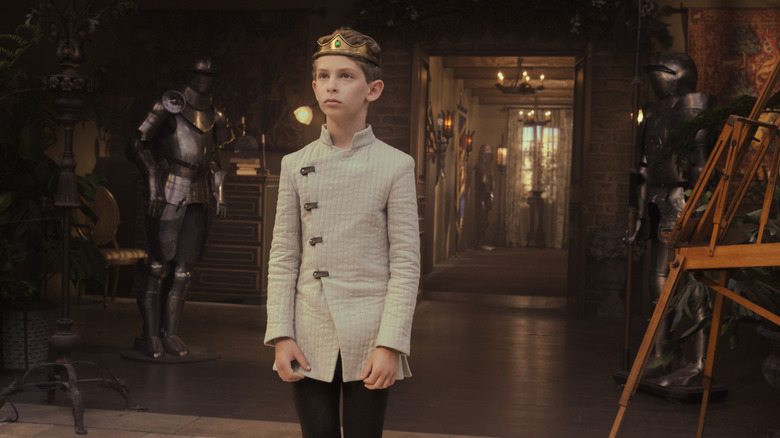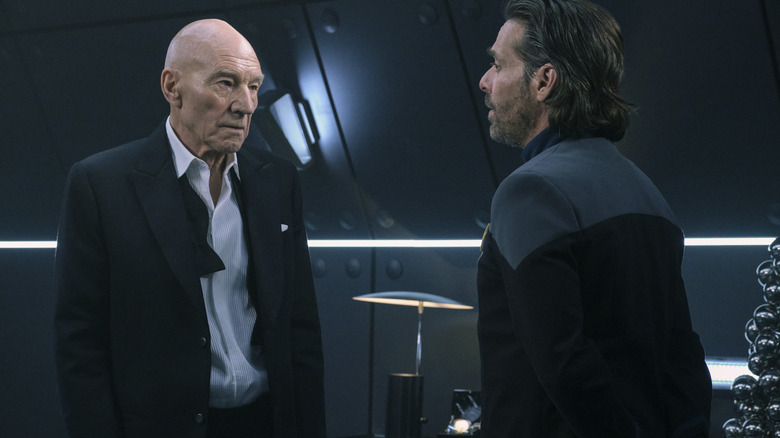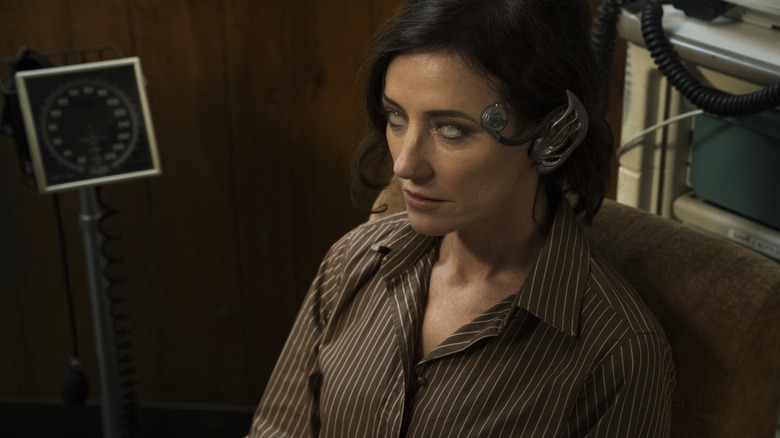Jean-Luc Battles A Mind Clown In Episode 7 Of Star Trek: Picard Season 2
The 23rd episode of season two of "Star Trek: Voyager" was called "The Thaw." In it, our heroes found a series of cryogenic stasis pods whose residents, while frozen, were wired into a computerized consciousness-sharing network that would allow them to converse and interact — "Matrix"-style — while they slept. The network had become so sophisticated, however, that it began to manifest anthropomorphic renditions of their most extreme emotional states. For years, the cryo-pod residents were held captive by the personification of fear, envisioned as an evil Clown played by Michael McKean. Capt. Janeway had to infiltrate the network, risking capture, to confront the Clown and ask a very philosophical question: What does fear want from us? A controversial opinion, perhaps, but: "The Thaw" is the best episode of "Voyager."
While sharing many similar story elements, "Monsters" — the seventh episode of "Star Trek: Picard" season 2 — may not be the show's best, but one cannot fault this new series on its visual variety. With fascist alternate timelines, the streets of modern-day L.A., a fancy dress ball, and now a nightmare world inside someone's brain, the showrunners have been working overtime to take audiences to many different places. Traditionally, in order to keep cameras from looking at the same starship sets week after week, "Star Trek" would stage away missions or run holodeck programs wherein the characters could be outdoors, could visit Paris, could hang out on a bikini beach. Occasionally Q would transport the cast into a Robin Hood fantasy, or Kirk would go back in time.
"Picard" is working really, really hard to provide the same array of locales within the strictures of its one-big-mystery plot. And while the plot isn't becoming any more intriguing (I regret to reiterate), and there will be some additional story solecisms, at least we're going to be visiting some bonkers places on the way down the road.
Picard is a fancy lad
You'll recall that at the end of episode 6, Picard (Patrick Stewart) had been run down by a bitter Adam Soong (Brent Spiner), acting under the instructions of Q (John De Lancie) who was, in turn, attempting to rewrite history and lead Earth to a fascist future. Picard fell into a coma and was rushed to the clinic of Dr. Ramirez (Sol Rodiguez) where Capt. Rios (Santiago Cabrera), Raffi (Michelle Hurd), Seven (Jeri Ryan), and the Watcher, Tallinn (Orla Brady) determine that he requires a mind-meld to survive; Picard has retreated into dreams. Luckily, the Watcher has a widget that will allow her to hack into Picard's brain and interact with images in his subconscious.
Inside his mind, Picard imagines himself being psychoanalyzed by a Starfleet shrink (James Callis), and is, in turn, recalling his own boyhood (wherein he is played by Dylan Von Halle) and he is interacting with his mother Yvette (Madeline Wise). But this is not Picard's actual childhood, but instead a fantasy childhood wherein he is a young prince, his mother is a queen, and their castle is being infiltrated by monsters and evil clowns. This Trekkie remains skeptical that the appearance of a mind clown was a coincidence, and not an explicit reference to "The Thaw."
There has been a running subplot throughout this second season pertaining to Jean-Luc's relationship with his mother. Picard rarely talked about his parents on "Star Trek: The Next Generation," other than facing a grumpy, disapproving dad in one scene in the episode "Tapestry," so this is new ground for the character. It's not ground audiences necessarily need covered, but here we are. In his fantasy, Picard envisions his mother as a noble protector from evil enemies. It's only through the interference from the Starfleet shrink that Picard will come to realize that his mother was, in fact, bipolar, and that the monsters were in her imagination. The true identity of the Starfleet shrink will be revealed to be that of Picard's father, Maurice.
Using sci-fi or fantasy conceits to literally face your traumas, fears, or remnants of a flawed upbringing is a fair narrative tool, it seems out-of-place in "Picard." Jean-Luc Picard was not a character marked by trauma. He did have an artificial heart — a leftover from an ill-advised bar brawl experienced during his last days at Starfleet Academy — but Picard was an adult, mature, and resolute character. If anything, Picard was aspirational. Not a perfect superbeing, of course, but always working hard to lead well and improve himself. "Picard" has invented trauma for the character, just so there would be a reason for him to overcome it.
Mean, green, an evil Queen
In the above picture, an astute observer might note that Tallinn is wearing an earpiece with a point on the top. Although Tallinn is played by the same actress who played Laris, Picard's Romulan maid in previous episodes, the two characters don't seem to be meaningfully connected. In "Monsters," Tallinn will reveal that she is, in fact, Romulan, and has been tasked (by whom, we never learn) with watching over Renée Picard, one of Jean-Luc's ancestors. From this we can intuit that Tallinn is perhaps an ancestor of Laris. Is Laris watching over Jean-Luc? Is Jean-Luc a cog in a greater cosmic machine? Is his ultimate function going to lock into the fate of the galaxy?
Golly, I hope not. I don't want Picard to become Darth Vader. I don't want the character to have any greater significance than his job as a Starfleet captain, and then, later, as an elderly vintner. It's a screenwriting mistake to assign plot or story importance to a character merely because they are important to the audience. Let Picard live out his life with dignity.
Elsewhere in "Monsters," Dr. Juarti (Alison Pill) has been unleashed in the streets of L.A. with the consciousness of the Borg Queen (Annie Wersching) slowly taking over her brain. Whenever the Queen/Juradti gets a rush of endorphins, the Queen's influence becomes stronger. While it's certainly not a good thing that a Borg is loose in 2024 L.A., and while the fate of Dr. Jurati is a question mark, I wonder what damage a single Borg could do without access to Borg technology. Previously, the Borg would assimilate people into their collective and absorb any species that dared to oppose their soulless, machine-like collective. I can't see what sort of shenanigans a Borg Queen could get up to while occupying the body of Alison Pill; she has no tools to contact other Borgs, nor does she have the means to assimilate others. I guess the true nature of her threat will be explained later.
The X-Files
Picard, having recovered from his mind clown episode, will return to Ten Forward to visit Guinan (Ito Aghayere) as she may have the means to contact Q. He certainly has some 'splaining to do. Guinan, it turns out, has a magical booze bottle in her bar that can summon Q like a genie. She explains — very, very quickly — that her species, the El Aurians, once struck a truce with the Q Continuum over a glass of alcohol, and now that same alcohol can be used to summon a representative. This seems like a pretty significant detail in the annals of Trek, and goes toward explaining why Guinan and Q had a mysterious rivalry in the "Next Generation" days. Sadly, "Picard" uses that rivalry as a plot point rather than a character moment; the rivalry provided this show with, essentially, an Uber app for Qs. But in the form of a magical genie bottle, so it's also stupid.
At the very least, the magical bottle didn't work, but instead summoned an FBI agent. "Monsters" closes with the revelation that Picard has been tailed by the Feds since his first transporter appearance in L.A., and the "Picard" version of Agt. Mulder is on his case. This is a promising wrinkle, as Picard interacting with modern-day X-Files investigators could lead to interesting conversations about the urgency of his mission, and to who he could reveal his true identity. Indeed ... should this not have been the plot of the L.A. scenes? That Picard and co. will have to spend a long time in custody, gather allies, and use the technology of the time to secretly investigate rising fascism? Like, in a real-world sort of way?
But I cannot talk to a show that wasn't made, only the one we had. Now that the alternate fascist future plot has been solved, we now must trudge through the falling action of the story. Perhaps there will be interesting visuals along the way.



